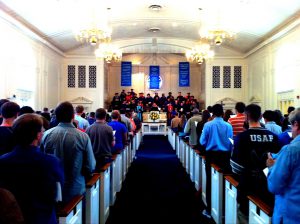Theologically Educate
September 23rd, 2011
Brothers and sisters, as your President, I call this community to serious, sustained theological reflection. Our mission statement calls for us to “theologically educate.” What does this mean? Properly speaking to “theologically educate” forms heart, mind and action. Beloved, it is not enough to declare that “your heart is in the right place.” Your mind must also be in the right place. Your feet and hands must also be in the right place. Traditionally, theology has served four functions: catechetical, apologetical, homiletical, and pastoral. Catechetical is to train children and new believers in the faith, thus assuring that the apostolic message and not some “other gospel” is being transmitted. This happens in homes, in daily life and in confirmation classes. Catechesis comes from the verb “to echo.” We must assure that new and current believers under our charge fully understand and “echo” the apostolic faith. Apologetical is the role of theology in helping to apply the Biblical text to whatever challenges happen to beset the church in any given generation; for us, this might mean everything from postmodern epistemologies, to philosophical relativism, to the new atheism, to the commoditization of culture, and so forth. The homiletical function is our commitment to train men and women to properly and effectively proclaim God’s word, evangelistically to the world as well as faithful instruction to the church by applying the Word of God faithfully to our lives. Finally, the pastoral function calls us to shepherd God’s flock, care for those in need, comfort the bereaved, and counsel the distressed. Today, looking across the evangelical landscape, catechesis is in disarray, apologetics is weak; our preaching has ground down to bland moralizing, and our pastoral efforts have become captive to pragmatism.
Asbury stands ready, with this esteemed faculty, to theologically educate a new generation of church leaders. Theology matters. It was Thomas Oden who famously remarked that “when a pastor (theologian) fails to distinguish between orthodoxy and heterodoxy, it is roughly equivalent to a physician forgetting the difference between disease and health.”1 For if we don’t have theological stability, we cannot have ethical stability, and if we don’t have ethical stability, we won’t have stability of worship, and if we do not have stability of worship, then we are no longer related vitally and necessarily to the headship of Jesus Christ. The Apostolic proclamation will be lost in a post-modern sea of autonomous self-definitions.
If today’s evangelical church is really marked by shallowness, thinness and cultural sameness, then, to use the phrase of Jack Davis, perhaps it is time we become “deep, thick and different.” A deep church is one which takes the encounter with a holy God seriously and is shaped by spiritual disciplines, holiness and catechesis. A deep church is the opposite of a shallow one. We are to exhibit a deep understanding of the holiness and weightiness of God. In Hebrew the word for honor and glory is kbd (kabod), meaning “heavy.” God has become far too lightweight in contemporary evangelicalism. The great sense of God’s transcendence and holiness must, once again, overtake post-modernity’s sense of over familiarity and casualness in God’s presence. Indeed, we are profoundly in need of recapturing the sense of God’s presence. Nietzsche’s madman who described churches as “the tombs and sepulchers of God” does, in fact, capture something of the movement from the real presence of Christ to the real absence of Christ in the experience of many churches today. A thick church contrasts with a thin one and is characterized by thick relationships and commitments and where worship is not a product we consume, but the great ontological orientation of our lives. We are the people of the Risen Lord. The consumeristic, therapeutic self of modernity is, through the gospel, the trinitarian, ecclesial self of the New Creation. A different church is one not marked by cultural sameness, but, instead, is a manifestation of the in-breaking of the New Creation. A visitor should feel somewhat out of place when they walk into our midst, as they encounter people with a radically distinctive orientation. A different church is one which is profoundly distinct from the culture in its “ontology, theology, worship and moral behavior.”2 To be different is to be a community marked by metanoia. Brothers and sisters, may the shallowness, thinness and cultural sameness of our churches become churches, under God and your leadership, which are deep, thick and different.
1 Thomas C. Oden, Agenda for Theology: After Modernity, What? (Grand Rapids: Zondervan, 1990), 59.
2 John Jefferson Davis, Worship and the Reality of God (Grand Rapids: IVP Academic, 2010), 32.
(Part 5 of 6 from Dr. Timothy C. Tennent’s Convocation address at Asbury Theological Seminary on September 6, 2011)
Just joining this series? Go back here to start at the beginning of this 6 part blog series.
Feedback
Please fill out the form below if you would like to provide feedback to Dr. Tennent concerning this blog entry.


